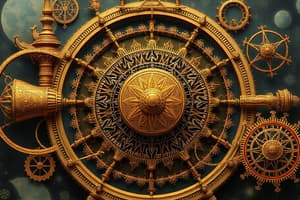Podcast
Questions and Answers
क्लासिकल मेकेनिक्स में न्यूटन के नियमों का क्या महत्व है?
क्लासिकल मेकेनिक्स में न्यूटन के नियमों का क्या महत्व है?
- यह गति के बहुत छोटे कणों के लिए लागू होते हैं।
- यह गति का नियम और बल के बीच का संबंध बताते हैं। (correct)
- यह थर्मोडायनामिक्स के नियमों से अव्यवस्थित होते हैं।
- यह ऊर्जा के अनिश्चित सिद्धांतों पर निर्भर करते हैं।
थर्मोडायनामिक्स का कौन सा नियम थर्मल संतुलन को परिभाषित करता है?
थर्मोडायनामिक्स का कौन सा नियम थर्मल संतुलन को परिभाषित करता है?
- तीसरा नियम
- दूसरा नियम
- जीरोथ नियम (correct)
- पहला नियम
मैक्सवेल के समीकरण किस सिद्धांत के मूल आधार हैं?
मैक्सवेल के समीकरण किस सिद्धांत के मूल आधार हैं?
- क्लासिकल मेकेनिक्स
- थर्मोडायनामिक्स
- क्वांटम मेकेनिक्स
- इलेक्ट्रोमैग्नेटिज्म (correct)
क्वांटम मेकेनिक्स में हाइजेनबर्ग का अनिश्चितता सिद्धांत क्या बताता है?
क्वांटम मेकेनिक्स में हाइजेनबर्ग का अनिश्चितता सिद्धांत क्या बताता है?
क्लासिकल मेकेनिक्स और क्वांटम मेकेनिक्स में मुख्य अंतर क्या है?
क्लासिकल मेकेनिक्स और क्वांटम मेकेनिक्स में मुख्य अंतर क्या है?
ऊर्जा के संरक्षण का सिद्धांत थर्मोडायनामिक्स में किस नियम द्वारा दर्शाया गया है?
ऊर्जा के संरक्षण का सिद्धांत थर्मोडायनामिक्स में किस नियम द्वारा दर्शाया गया है?
इलेक्ट्रोमैग्नेटिज्म में चुंबकीय क्षेत्र की उत्पत्ति किससे होती है?
इलेक्ट्रोमैग्नेटिज्म में चुंबकीय क्षेत्र की उत्पत्ति किससे होती है?
क्वांटम मेकेनिक्स में सुपरपोजिशन का क्या अर्थ है?
क्वांटम मेकेनिक्स में सुपरपोजिशन का क्या अर्थ है?
Flashcards
शास्त्रीय यांत्रिकी
शास्त्रीय यांत्रिकी
सूक्ष्म वस्तुओं की गति का वर्णन करने वाला विज्ञान। इसमें न्यूटन के नियम, बल, द्रव्यमान, त्वरण, संवेग और ऊर्जा जैसे अवधारणाएँ शामिल हैं।
न्यूटन के गति के नियम
न्यूटन के गति के नियम
शास्त्रीय यांत्रिकी के आधारभूत सिद्धांत जो बल, द्रव्यमान और त्वरण के बीच संबंध बताते हैं।
ऊष्मागतिकी
ऊष्मागतिकी
ऊष्मा, कार्य और ऊर्जा के बीच संबंधों का अध्ययन।
ऊष्मागतिकी का शून्यवाँ नियम
ऊष्मागतिकी का शून्यवाँ नियम
Signup and view all the flashcards
ऊष्मागतिकी का प्रथम नियम
ऊष्मागतिकी का प्रथम नियम
Signup and view all the flashcards
ऊष्मागतिकी का द्वितीय नियम
ऊष्मागतिकी का द्वितीय नियम
Signup and view all the flashcards
ऊष्मागतिकी का तृतीय नियम
ऊष्मागतिकी का तृतीय नियम
Signup and view all the flashcards
विद्युत चुम्बकत्व
विद्युत चुम्बकत्व
Signup and view all the flashcards
मैक्सवेल के समीकरण
मैक्सवेल के समीकरण
Signup and view all the flashcards
क्वांटम यांत्रिकी
क्वांटम यांत्रिकी
Signup and view all the flashcards
क्वांटीकृत ऊर्जा स्तर
क्वांटीकृत ऊर्जा स्तर
Signup and view all the flashcards
तरंग-कण द्वैत
तरंग-कण द्वैत
Signup and view all the flashcards
हिसेंबर्ग अनिश्चितता सिद्धांत
हिसेंबर्ग अनिश्चितता सिद्धांत
Signup and view all the flashcards
Study Notes
Classical Mechanics
- Classical mechanics describes the motion of macroscopic objects.
- It encompasses Newtonian mechanics, including concepts like force, mass, acceleration, momentum, and energy.
- Newton's laws of motion are fundamental to classical mechanics.
- Conservation principles like conservation of momentum and energy are key.
- Describes systems using deterministic equations, meaning given initial conditions, future behavior is predictable.
- Useful for analyzing the motion of planets, satellites, and everyday objects.
- Limitations emerge when dealing with very small objects (quantum mechanics) or very high speeds (relativity).
- Concepts like potential energy, kinetic energy, and work are central to the theory.
Thermodynamics
- Thermodynamics studies macroscopic properties of systems in terms of heat and work.
- Focuses on the relationship between thermal energy, work, and other forms of energy.
- Key laws include the zeroth, first, second, and third laws of thermodynamics.
- The zeroth law defines thermal equilibrium.
- The first law describes conservation of energy in thermodynamic processes.
- The second law dictates the direction of spontaneous processes and relates to entropy.
- The third law deals with entropy at absolute zero.
- Important applications include power generation, refrigeration, and heat transfer.
Electromagnetism
- Electromagnetism deals with electric and magnetic fields and their interaction.
- Maxwell's equations are fundamental to the theory.
- Explains phenomena like light, radio waves, and other electromagnetic radiation.
- Electric charges create electric fields, and moving charges create magnetic fields.
- The interaction between electric and magnetic fields gives rise to electromagnetic waves.
- Applications range from electronics and communication to medical imaging.
- Concepts like capacitance, inductance, and impedance are crucial.
Quantum Mechanics
- Quantum mechanics describes the behavior of matter at the atomic and subatomic levels.
- Unlike classical mechanics, it is probabilistic.
- Quantized energy levels and wave-particle duality are key.
- Wave functions describe the state of a quantum system.
- Heisenberg's uncertainty principle is a fundamental concept.
- Explains phenomena such as the photoelectric effect and atomic spectra.
- Key concepts include superposition, entanglement, and quantum tunneling.
Relativity
- Relativity encompasses special and general relativity, both developed by Einstein.
- Special relativity deals with the relationship between space and time for observers in uniform motion.
- It postulates the constancy of the speed of light.
- It results in concepts like time dilation and length contraction.
- General relativity describes gravity as a curvature of spacetime.
- It involves concepts like black holes and gravitational waves.
- It provides a more accurate description of gravity and motion at very high speeds and for massive objects than classical mechanics.
- It's crucial for understanding the large-scale structure of the universe.
Studying That Suits You
Use AI to generate personalized quizzes and flashcards to suit your learning preferences.




